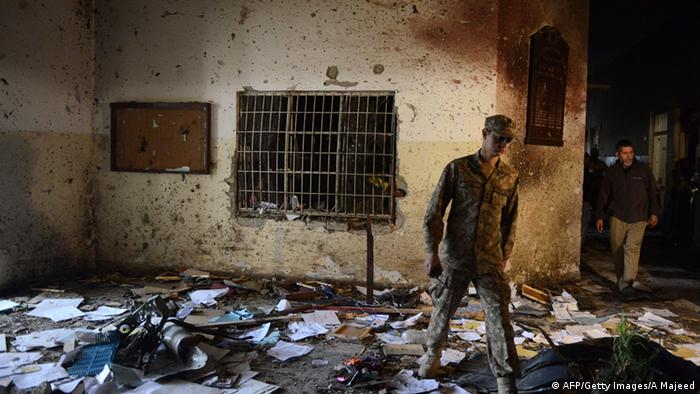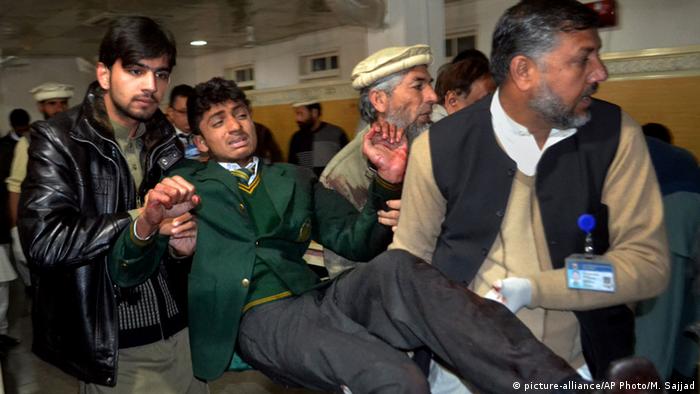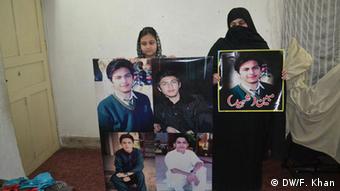One year since the Taliban attacks on a school in Pakistan's Peshawar city, the families of slain students are still struggling to come to terms with the tragedy. Have the authorities learnt any lesson from the incident?
"I can never forget that day. We are still traumatized. There were dead bodies all over the place. I was fortunate to have escaped the massacre, but my brother couldn't," Zakariya Aijaz, a student of Peshawar's Army Public School, told DW.
It's been one year since the Taliban stormed the school and killed over 141 people, mostly students, in one of the most heinous and barbaric terrorist attacks in Pakistan's history, but the wounds are still fresh. The Pakistani Taliban claimed the responsibility for the school siege and attack and said the assault was a "response to the military's 'Zarb-e-Azb' offensive."
"They shot my son Shehzad eleven times. What was his crime? How can I ever be at peace in this life?" Zakariya and Shehzad's father, Mian Aijaz Ahmed, spoke to DW in a broken voice.
"I don't care what the government has done to punish the culprits. My son won't come back," he added.
Dissatisfaction with the government's efforts
The victims' families are not satisfied with the government's response. They say that the perpetrators of the massacre are still at large, and the authorities have only taken half-hearted steps to eradicate terrorism.
DW's Peshawar correspondent Faridullah Khan says the parents of the slain students have decided to boycott all government ceremonies on December 16 that will be held to commemorate the attacks' first anniversary.
"We've been told that Prime Minister Nawaz Sharif wants to meet us on December 16. Isn't it sad that the premier realizes it only now, after one year, that he should come visit us?" Zahoor Ahmed, father of a slain student, told DW.
Fazal Khan, who heads a committee of the victims' families and relatives, says the government still seems to be in two minds about who to hold responsible for the assault.
"The Army Public School is situated in the most secure area of Peshawar. There are troops all over the cantonment. Then how did the terrorists succeed in launching such a massive attack?" said the mother of Mubin Shah. "If my son was not safe in the army cantonment, then nobody is safe anywhere in the country," she told DW.
Zahoor Ahmed believes the Peshawar attacks could not have happened without the support or connivance of some security officials. "The government should also punish the terrorists' accomplices and supporters."
Blaming others
The December 16 attacks led to widespread condemnation of the Taliban both locally and internationally. A large number of Pakistanis demanded the government take decisive action against all Islamist groups in the country once and for all.
Many hoped that the Peshawar attacks provided an excellent opportunity for the Pakistani authorities to do some introspection and re-evaluate the country's decades-old security policies. Islamabad, however, chose to put the blame on "external elements," yet again.
But long before the civilian government could reach a political consensus on how to deal with home-grown Islamists, a number of conservative political commentators, religious parties, and members of the security establishment had already begun talking about the alleged role of New Delhi and Kabul in the attack.
Zeenia Shaukat, an activist working for a labor rights institution in Karachi, does not find the Pakistani reaction surprising. "The 'Indian agents' thinking is deeply entrenched not only in the mindset of our policy-makers, but also among the general public. Unfortunately, the media too promotes the 'foreign forces-did-it' narrative," she told DW.
Former DW Urdu journalist and Islamabad based analyst Agha Sattar said that Pakistan needed a long-term policy to eradicate terrorism. "It might be true that some external elements were behind the Peshawar attack, but Islamabad needs to look internally as well," he told DW.
Military back in driving seat
Instead of punishing the school attackers and going after the Taliban, the Pakistani military used the incident to increase its political clout in the country, experts say. The army created a parallel judicial system in the country and established military courts, arguing that the civilian justice system was incapable of dealing with terrorism-related cases.
In the aftermath of the December 16 school massacre, Pakistan also lifted a seven-year-long moratorium on death penalties. More than 8,000 Pakistanis, including juveniles, are currently on death row, according to rights group Amnesty International (AI), which has sharply condemned the recent executions.
The South Asian country's National Action Plan (NAP), which was introduced after the Peshawar attacks, has given the army an upper hand in the security affairs, which in a democratic set up should have been the domain of Prime Minister Nawaz Sharif's government, according to the International Crisis Group (ICG).

The December 16 attacks led to widespread condemnation of the Taliban both locally and internationally
"The militarization of counter-terrorism policy puts at risk Pakistan's evolution toward greater civilian rule, which is itself a necessary but not sufficient condition to stabilize the democratic transition," said ICG. "The NAP looks far more like a hastily-conceived wish-list devised for public consumption during a moment of crisis than a coherent strategy," it added.
The ICG paper advises PM Sharif to take matters into his own hands and democratize the anti-terrorism strategy "in order to replace an overly militarized response with a revamped, intelligence-guided counter-terrorism strategy, led by civilian law enforcement agencies, particularly the police."
Islamabad-based civil society activist and researcher Salim Shah believes the authorities are "hanging or using the hanging as a means to harass political opponents such as the nationalists in the western Balochistan province, or other political parties that are disliked by the military."
Selective operations
"The Taliban have been weakened, but retains the ability to carry out attacks like this. It would probably be harder for them to launch attacks further away from their area of operations, say in the eastern Punjab province, but Peshawar is very accessible from the tribal areas and would be an obvious target, as the army formation running the operation is based there," Omar Hamid, head of Asia Pacific Country Risk at the global analytics firm IHS in London, told DW.
Islamabad-based journalist for Dawn newspaper, Irfan Haider, says that the ongoing North Waziristan military offensive has not been effective due to a lack of coordination between the civil and military intelligence agencies.
"The militant organizations are operating with different names, making it difficult for the federal and provincial governments to deal with them," Haider told DW.
However, analyst Abdul Agha is of the view that his country's powerful army is responsible for the continuing strength of the Islamists. "They are nurturing and supporting a number of militant groups. The result is that they are still very active," he told DW.
Commenting on the army operation, Agha said "the government is going after the [militant groups] that have turned against the state, or who don't agree with its long-term plans vis-à-vis Afghanistan. Pakistan wants to eliminate some and will preserve some for the future."



No comments:
Post a Comment